Clock.Win32.Ransomware virus (Virus Removal Guide)
Clock.Win32.Ransomware virus Removal Guide
What is Clock.Win32.Ransomware virus?
Does Clock.Win32.ransomware pose a threat?
While some hardcore hackers are working relentlessly to publish new Cerber versions, others take it easy and amuse society with such viruses as Clock.Win32 virus. The threat, which was discovered by a virus researcher, Jakub Kroustek, might be affiliated with the same crooks which launched In-development and Smash! ransomware viruses lately. Looking from a technical perspective, they do not cause so much trouble as usual ransomware threats. They do not encode files with an elaborate algorithm. However, they still manage to infiltrate computers. After doing so, this virus presents the ransom note and associated windows in Windows ME 32-bit style. It demands $20. Summarizing all these features, you should not worry about your encrypted files as the threat does not modify them. Nonetheless, like previously mentioned Smash virus, it is able to disable Registry Editor and Command Prompt. Thus, you should not ignore this cyber infection and remove Clock.Win32 right away. FortectIntego is one of the solutions how you can do it quickly and effortlessly.
This virus may also be classified as a lock screen threat as you cannot easily exit the messages display by the virus. Simply hitting the “x” is ineffective. If you decide to run Registry Editor or Command prompt, you get the response with obvious grammar mistakes: “You’re registry editor is disabled.” The ransomware, which is alternatively called Clock, also presents the email address for access: minecakepvp@gmail.com. However, there is no need to pay any money as the virus does not affect your files in any way. Clock.Win32 malware is just another attempt to show off. Though it raises amusement for virus researchers, ordinary users infected by the malware might not regard this virus funny at all. The fact that the virus was able to infiltrate the system suggests that there are crucial flaws in cyber security. Clock.Win32 removal should become your utmost priority. If you delay doing it, the malware might “invite” unwanted guests – more aggressive cyber viruses. In addition, CLock reveals a current trend among the hackers to shift towards new operation and execution techniques. Combining all of them might result in an invincible cyber threat.
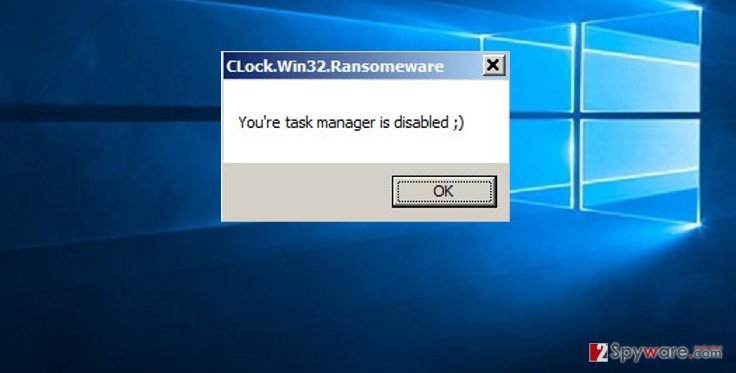
How does the threat manage to invade the devices?
Spam messages and compromised websites are the main viri distribution techniques. Users, who tend to download games or other content from P2P file sharing domains, risk getting targeted by the virus. In the first case, be careful of spam messages, especially the ones which claim to be invoices, delivery package notifications or warnings from official institutions. They might contain .doc, .dll, or .js files with malicious executables. In addition, trojans facilitate the distribution of ransomware. Though it might not be the case of Clock.Win32 hijack, you should arm up with the latest version of your security program to ward off diverse malicious files and apps. Watch out for questionable links in social networks and web pages overcrowded with advertisements as well.
Clock.Win32 elimination guidelines
Luckily, this ransomware does not cause such cyber troubles as other samples of the same category. You can remove Clock.Win32 virus with the help of malware removal tools, FortectIntego and Malwarebytes, for instance. The following instructions come in handy in case file-encrypting viruses block access to vital system functionalities. There should be no such problems with Clock.Win32 removal. To sum up, the current trends reveal different gangs of crooks working in the dark market. While some are just a bunch of teenagers, others are the members of organized criminal groups which implement various techniques whose actions leave a destructive impact on a global scale.
Getting rid of Clock.Win32.Ransomware virus. Follow these steps
Manual removal using Safe Mode
Important! →
Manual removal guide might be too complicated for regular computer users. It requires advanced IT knowledge to be performed correctly (if vital system files are removed or damaged, it might result in full Windows compromise), and it also might take hours to complete. Therefore, we highly advise using the automatic method provided above instead.
Step 1. Access Safe Mode with Networking
Manual malware removal should be best performed in the Safe Mode environment.
Windows 7 / Vista / XP
- Click Start > Shutdown > Restart > OK.
- When your computer becomes active, start pressing F8 button (if that does not work, try F2, F12, Del, etc. – it all depends on your motherboard model) multiple times until you see the Advanced Boot Options window.
- Select Safe Mode with Networking from the list.
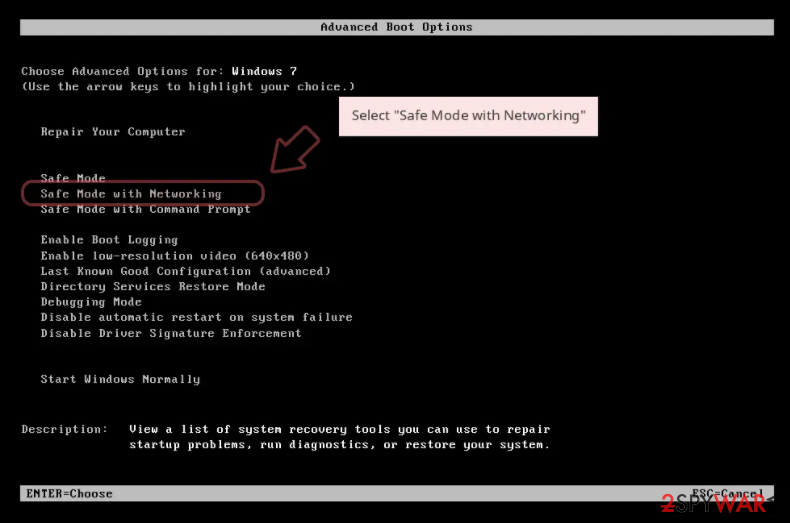
Windows 10 / Windows 8
- Right-click on Start button and select Settings.
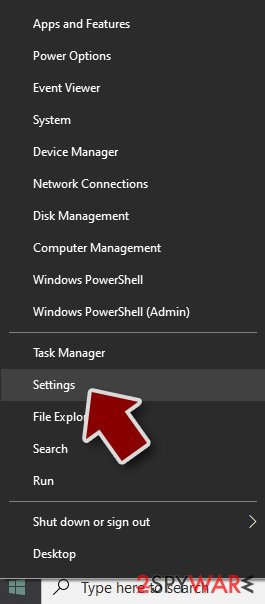
- Scroll down to pick Update & Security.
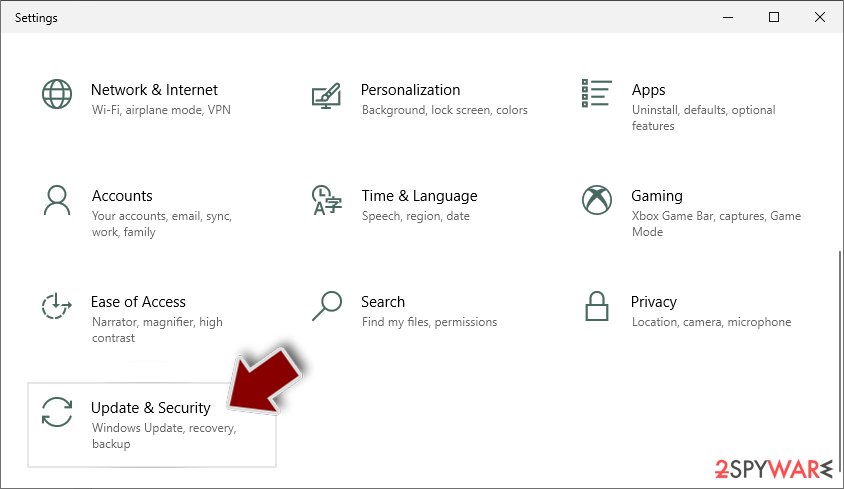
- On the left side of the window, pick Recovery.
- Now scroll down to find Advanced Startup section.
- Click Restart now.
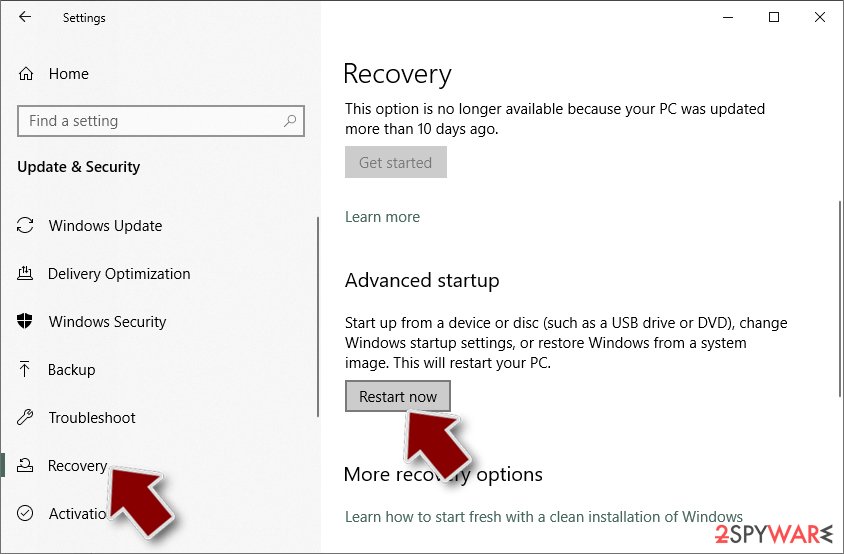
- Select Troubleshoot.
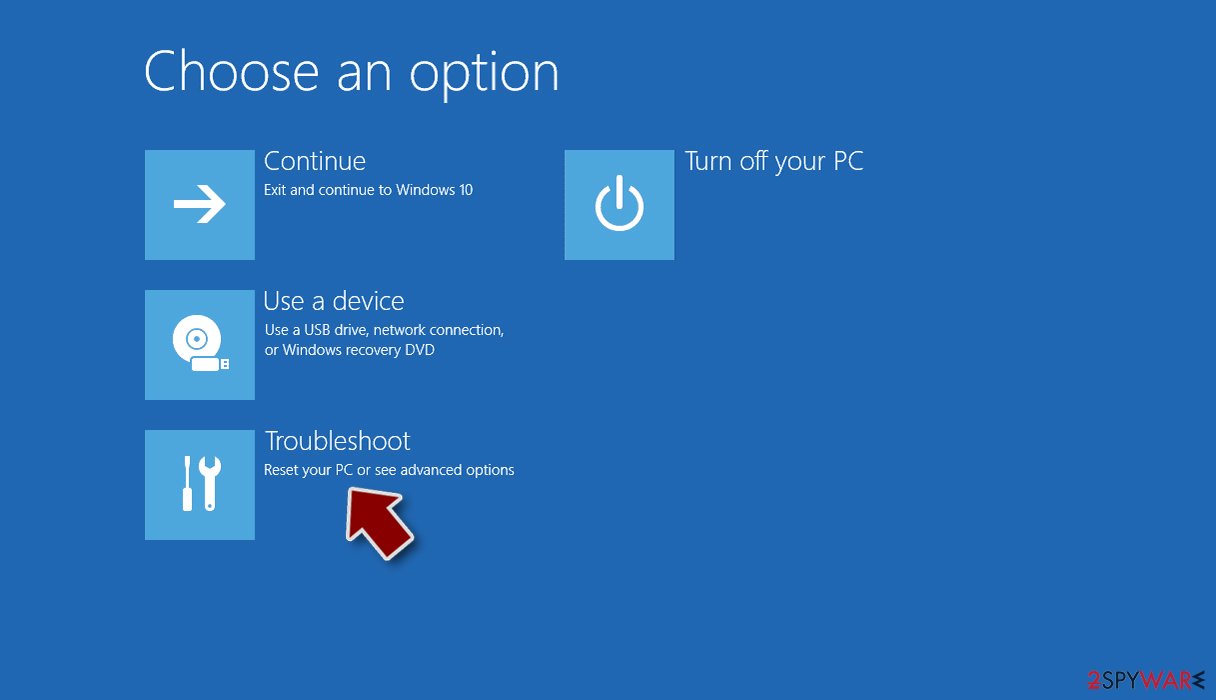
- Go to Advanced options.
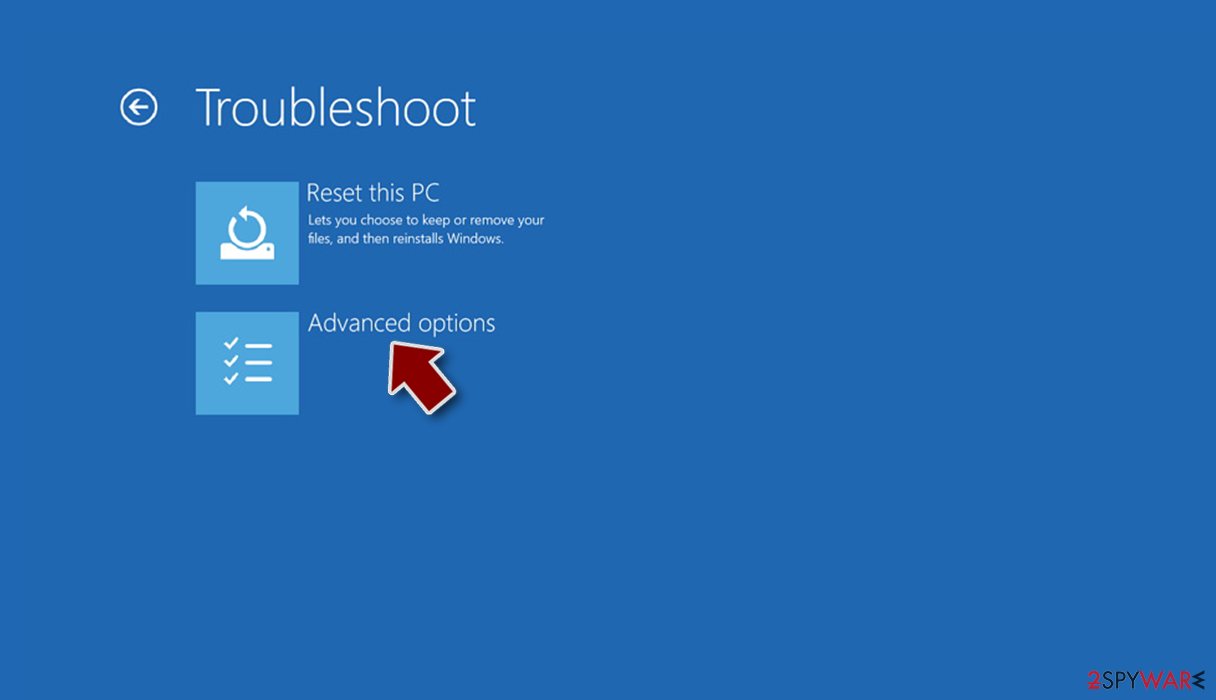
- Select Startup Settings.
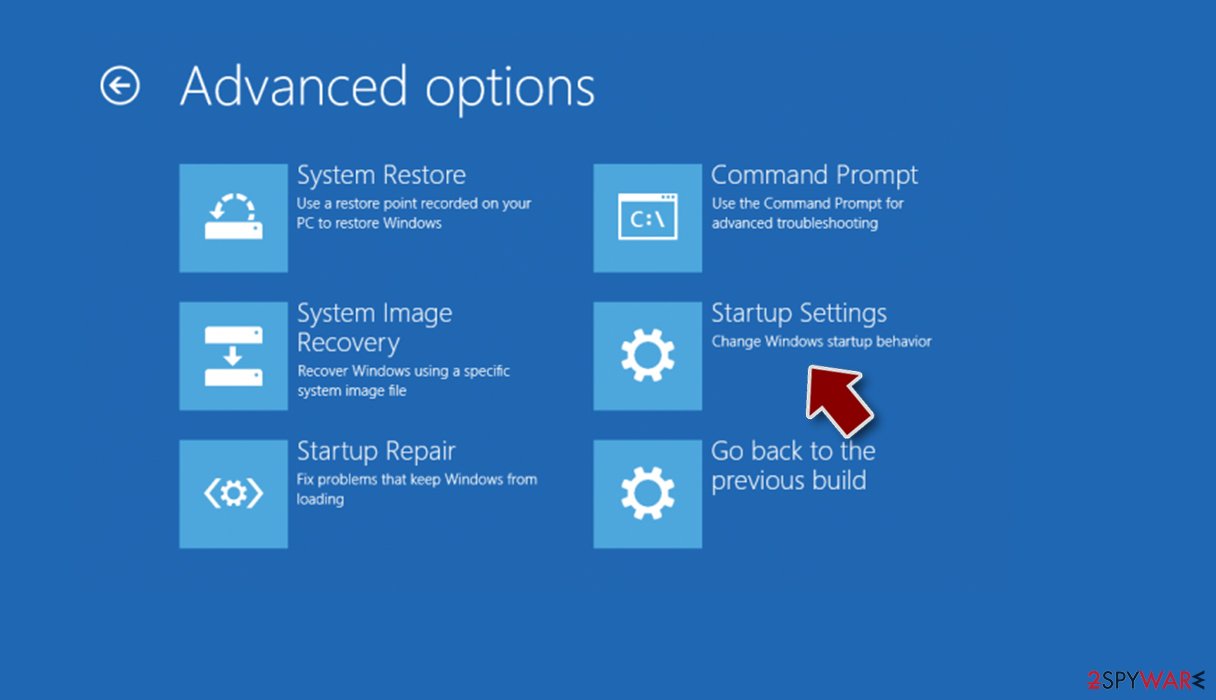
- Press Restart.
- Now press 5 or click 5) Enable Safe Mode with Networking.
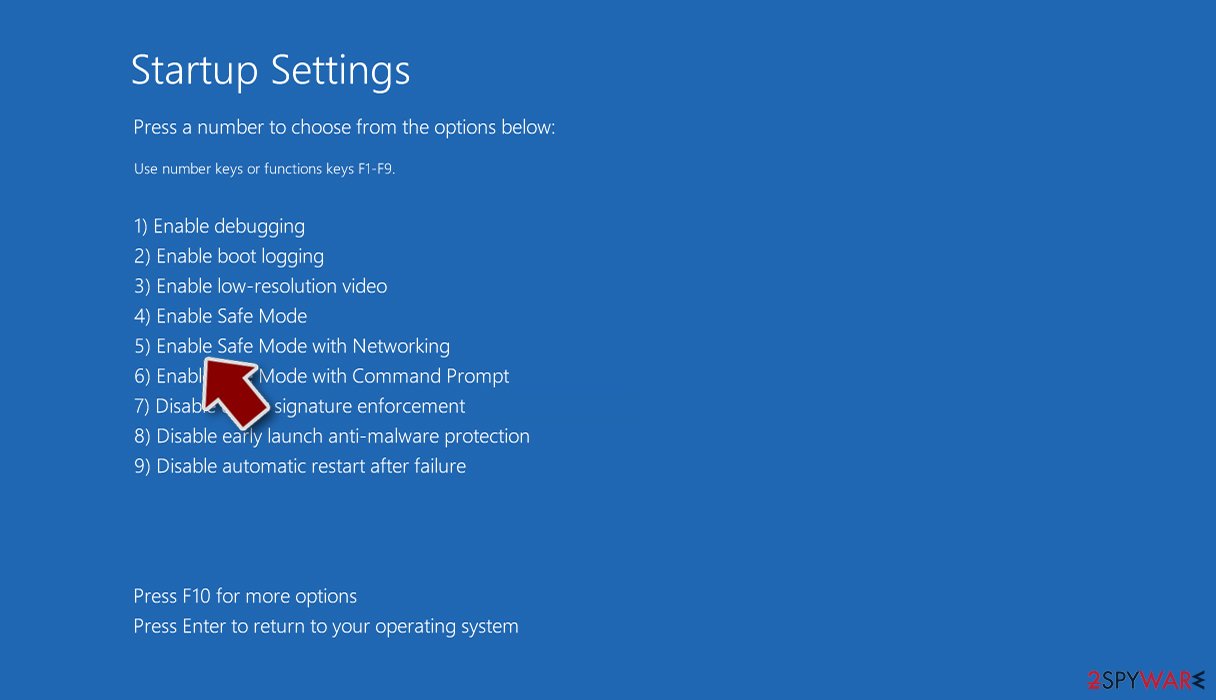
Step 2. Shut down suspicious processes
Windows Task Manager is a useful tool that shows all the processes running in the background. If malware is running a process, you need to shut it down:
- Press Ctrl + Shift + Esc on your keyboard to open Windows Task Manager.
- Click on More details.
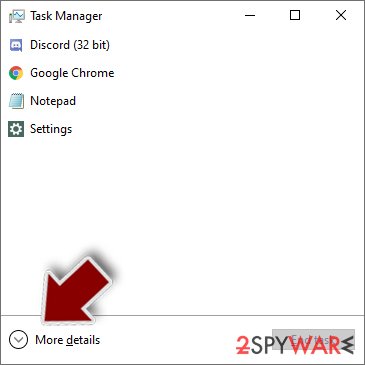
- Scroll down to Background processes section, and look for anything suspicious.
- Right-click and select Open file location.
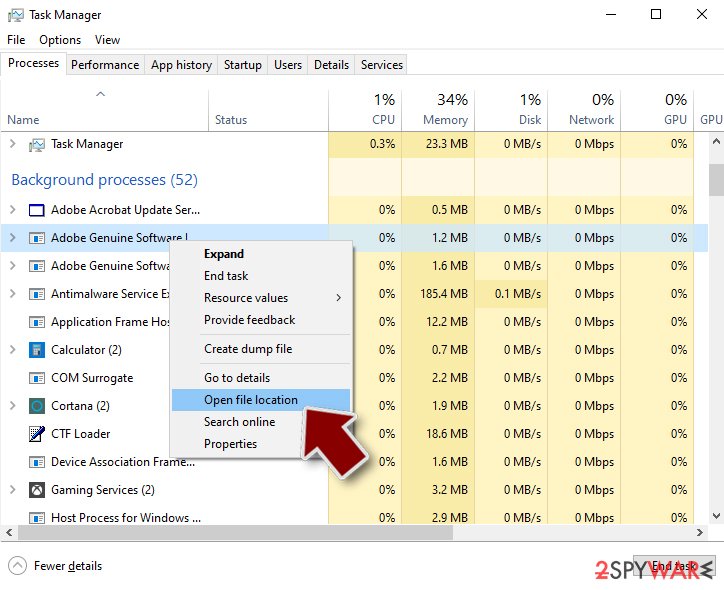
- Go back to the process, right-click and pick End Task.
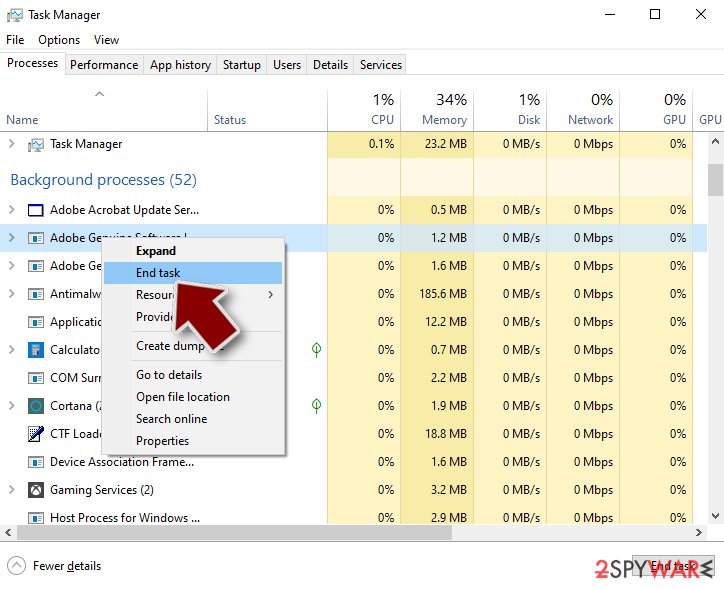
- Delete the contents of the malicious folder.
Step 3. Check program Startup
- Press Ctrl + Shift + Esc on your keyboard to open Windows Task Manager.
- Go to Startup tab.
- Right-click on the suspicious program and pick Disable.
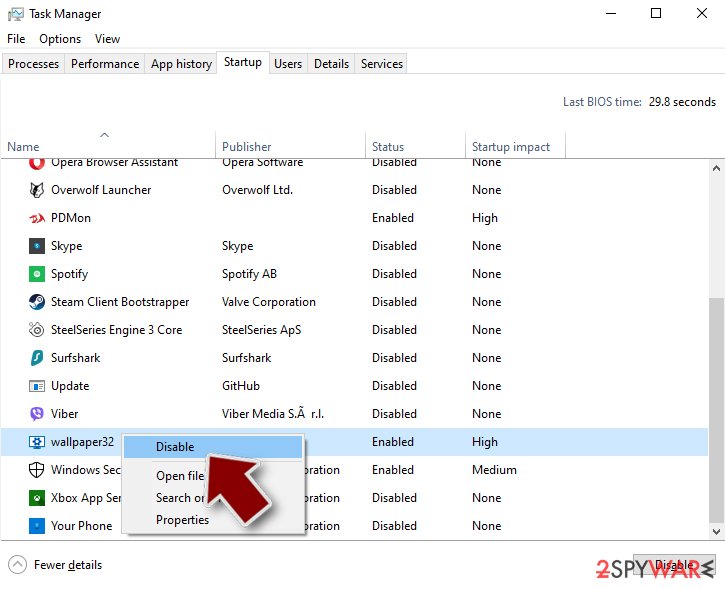
Step 4. Delete virus files
Malware-related files can be found in various places within your computer. Here are instructions that could help you find them:
- Type in Disk Cleanup in Windows search and press Enter.
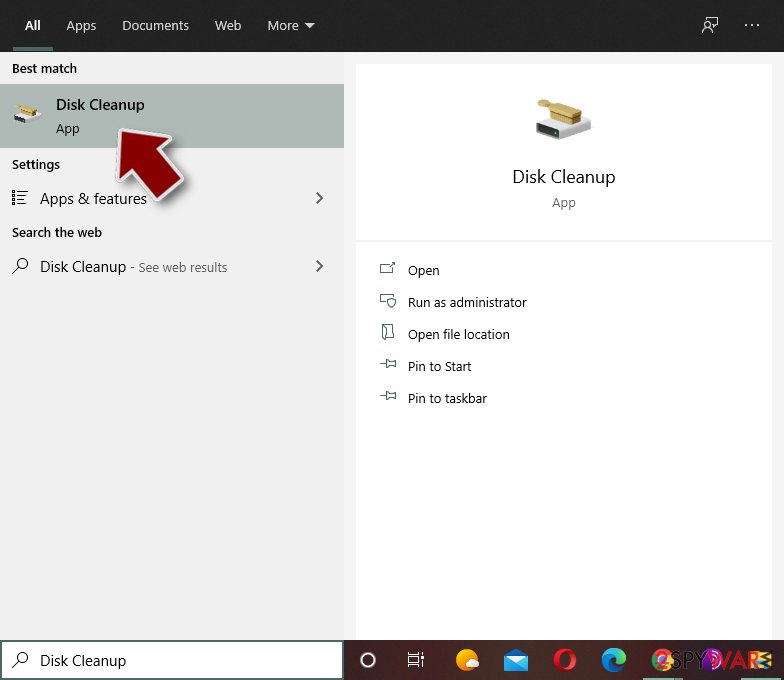
- Select the drive you want to clean (C: is your main drive by default and is likely to be the one that has malicious files in).
- Scroll through the Files to delete list and select the following:
Temporary Internet Files
Downloads
Recycle Bin
Temporary files - Pick Clean up system files.
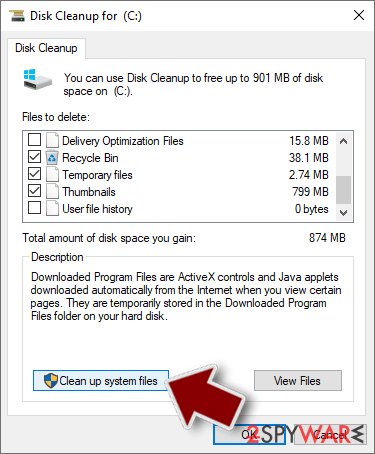
- You can also look for other malicious files hidden in the following folders (type these entries in Windows Search and press Enter):
%AppData%
%LocalAppData%
%ProgramData%
%WinDir%
After you are finished, reboot the PC in normal mode.
Remove Clock.Win32.Ransomware using System Restore
-
Step 1: Reboot your computer to Safe Mode with Command Prompt
Windows 7 / Vista / XP- Click Start → Shutdown → Restart → OK.
- When your computer becomes active, start pressing F8 multiple times until you see the Advanced Boot Options window.
-
Select Command Prompt from the list

Windows 10 / Windows 8- Press the Power button at the Windows login screen. Now press and hold Shift, which is on your keyboard, and click Restart..
- Now select Troubleshoot → Advanced options → Startup Settings and finally press Restart.
-
Once your computer becomes active, select Enable Safe Mode with Command Prompt in Startup Settings window.

-
Step 2: Restore your system files and settings
-
Once the Command Prompt window shows up, enter cd restore and click Enter.

-
Now type rstrui.exe and press Enter again..

-
When a new window shows up, click Next and select your restore point that is prior the infiltration of Clock.Win32.Ransomware. After doing that, click Next.


-
Now click Yes to start system restore.

-
Once the Command Prompt window shows up, enter cd restore and click Enter.
Bonus: Recover your data
Guide which is presented above is supposed to help you remove Clock.Win32.Ransomware from your computer. To recover your encrypted files, we recommend using a detailed guide prepared by 2-spyware.com security experts.If your files are encrypted by Clock.Win32.Ransomware, you can use several methods to restore them:
The efficiency of Data Recovery Pro
It is useful to keep this app on the computer if you struggle to find missing files. It is worth gve it a try decrypting the files after a serious ransomware attack.
- Download Data Recovery Pro;
- Follow the steps of Data Recovery Setup and install the program on your computer;
- Launch it and scan your computer for files encrypted by Clock.Win32.Ransomware ransomware;
- Restore them.
Finally, you should always think about the protection of crypto-ransomwares. In order to protect your computer from Clock.Win32.Ransomware and other ransomwares, use a reputable anti-spyware, such as FortectIntego, SpyHunter 5Combo Cleaner or Malwarebytes
How to prevent from getting ransomware
Do not let government spy on you
The government has many issues in regards to tracking users' data and spying on citizens, so you should take this into consideration and learn more about shady information gathering practices. Avoid any unwanted government tracking or spying by going totally anonymous on the internet.
You can choose a different location when you go online and access any material you want without particular content restrictions. You can easily enjoy internet connection without any risks of being hacked by using Private Internet Access VPN.
Control the information that can be accessed by government any other unwanted party and surf online without being spied on. Even if you are not involved in illegal activities or trust your selection of services, platforms, be suspicious for your own security and take precautionary measures by using the VPN service.
Backup files for the later use, in case of the malware attack
Computer users can suffer from data losses due to cyber infections or their own faulty doings. Ransomware can encrypt and hold files hostage, while unforeseen power cuts might cause a loss of important documents. If you have proper up-to-date backups, you can easily recover after such an incident and get back to work. It is also equally important to update backups on a regular basis so that the newest information remains intact – you can set this process to be performed automatically.
When you have the previous version of every important document or project you can avoid frustration and breakdowns. It comes in handy when malware strikes out of nowhere. Use Data Recovery Pro for the data restoration process.







